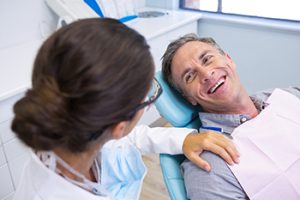Emergency Dental Care Made Simple
At North East Dental Arts, Dr. Dina Nuhfer and our dental team understand that dental emergencies can be distressing, which is why our team is dedicated to providing prompt and compassionate emergency dental services on the same day or by walk-in to our dental practice.
If you’re experiencing tooth pain, a knocked-out tooth, or a dental infection, our skilled team is here to help. With state-of-the-art facilities and advanced treatment options, we strive to alleviate discomfort and restore your oral health promptly. For emergency assistance, call our North East, PA, dental practice at (814) 725-4700.

What is Emergency Dentistry?
Emergency dentistry deals with urgent dental issues requiring immediate attention. Dental emergencies can range from sudden toothaches to traumatic injuries affecting the mouth and teeth. Prompt intervention in such cases is crucial to alleviate pain, prevent further damage, and preserve oral health.
Common Dental Emergencies
Toothache
Toothaches can result from various causes, including dental decay, infection, or trauma. Immediate evaluation by our North East emergency dentist is essential to identify and address the underlying issue causing the pain.
Chipped or Broken Tooth
Accidents or injuries can lead to chipped or fractured teeth. Depending on the severity, treatment may involve dental bonding, a crown, or other restorative procedures to restore the tooth’s structure and function.
Knocked-Out Tooth
A knocked-out tooth requires immediate attention to increase the chances of successful re-implantation. Proper handling of the tooth, keeping it moist, and seeking dental care within the first hour significantly improves the likelihood of saving the tooth.
Lost Filling or Crown
A lost filling or crown can expose the underlying tooth structure, leading to sensitivity and potential damage. Prompt dental care is necessary to replace the filling or crown and prevent further complications.
Abscess or Dental Infection
Dental abscesses are localized collections of pus caused by bacterial infection. These infections can cause severe pain, swelling, and even systemic complications if left untreated. Drainage of the abscess and antibiotic therapy are typically required.
Jaw Injury
Trauma to the jaw can result in fractures, dislocations, or other serious injuries. Immediate medical attention is necessary to assess and manage the injury, which may involve immobilization, surgery, or other interventions.
Immediate Steps for Dental Emergencies
When a dental emergency occurs, it’s important to take immediate action before seeing our North East emergency dentist on the same day or by a walk-in emergency visit to our dental practice.
- Toothache Relief Measures: Rinse the mouth with warm salt water, use over-the-counter pain relievers, and apply a cold compress to alleviate pain temporarily. Avoid placing aspirin directly on the gums, as it can cause burns.
- Handling Broken or Knocked-Out Teeth: Handle the tooth by the crown (top part), not the roots. Rinse it gently with water if it’s dirty, and try to reinsert it into the socket if possible. If not, place it in a container of milk or saliva and seek dental care immediately.
- Managing Dental Infections: Rinse with warm salt water, use over-the-counter pain relievers, and avoid applying heat to the affected area. Seek professional dental care promptly to address the infection and prevent its spread.
- First Aid for Jaw Injuries: Apply a cold compress to reduce swelling, and seek immediate medical attention. Avoid moving the jaw excessively and follow any instructions provided by healthcare professionals.
When to Seek Emergency Dental Care
Recognizing the signs and symptoms that indicate a dental emergency is crucial. These may include:
- Severe pain
- Bleeding
- Swelling
- Trauma to the mouth
- Signs of infection, such as fever and pus drainage
Prompt intervention is essential to prevent complications and preserve oral health.

What to Expect at an Emergency Dental Visit
Patients can expect a structured process designed to address their urgent dental needs efficiently during an emergency dental visit. Here’s what you can typically expect during an emergency dental appointment:
- Prompt Evaluation: Upon arrival, you will be promptly evaluated by the dental staff. They will inquire about your symptoms, dental history, and any recent trauma or incidents that led to the emergency.
- Diagnostic Procedures: The dentist may perform diagnostic procedures, such as X-rays or intraoral dental examinations, to assess the extent of the dental issue and determine the most appropriate course of treatment.
- Pain Management: If you’re experiencing pain or discomfort, the dentist will prioritize pain management. This may involve administering local anesthesia to numb the affected area or prescribing pain relievers to alleviate discomfort.
- Treatment Planning: Based on the evaluation and diagnostic findings, the dentist will formulate a treatment plan tailored to address your specific dental emergency. They will discuss the recommended procedures, associated risks, and expected outcomes with you.
- Immediate Interventions: In many cases, emergency dental visits involve providing immediate interventions to address the acute problem. This may include temporary repairs for broken teeth, drainage of abscesses, or stabilization of injured teeth or jaws.
- Follow-Up Care: Depending on the nature of your dental emergency, you may be advised to schedule follow-up appointments for additional treatment or monitoring. It’s important to adhere to any post-treatment instructions provided by the dentist to optimize healing and outcomes.
Tips for Preventing Dental Emergencies
To ensure you can prevent dental emergencies, Dr. Desai recommends doing the following:
- Maintaining Good Oral Hygiene: Brushing twice daily, flossing daily, and visiting the dentist regularly can help prevent dental problems that may lead to emergencies.
- Protective Measures for Sports and Physical Activities: Wear mouthguards during sports or activities that pose a risk of dental injury to prevent trauma to the teeth and mouth.
- Regular Dental Checkups and Cleanings: Routine dental visits allow for early detection of potential issues and preventive interventions to maintain oral health.
Frequently Asked Questions
What should I do if I have a dental emergency after hours or on weekends?
If you experience a dental emergency outside of regular office hours, you can contact emergency dental hotlines, visit urgent care dental clinics, or seek care at hospital emergency rooms. Many dental offices also provide after-hours emergency services or have on-call dentists available for urgent situations.
How do I know if my dental issue is an emergency or if I can wait until regular office hours?
Dental emergencies often involve severe pain, bleeding, swelling, or trauma to the mouth. If you’re unsure whether your issue constitutes a dental emergency, it’s best to err on the side of caution and seek professional advice. Many dental offices offer phone consultations to help determine the urgency of your situation.
What should I do if I have a dental emergency and I don’t have dental insurance?
Dental emergencies require prompt attention, regardless of insurance coverage. Many dental clinics offer flexible payment options or financing plans to help patients afford emergency dental treatment. Additionally, some community health centers or dental schools may provide low-cost or sliding-scale fee services for individuals without insurance.
Contact Us Today for Emergency Dental Care
If you’re experiencing a dental emergency or have any concerns about your oral health, don’t hesitate to reach out to us at North East Dental Arts. Our team is here to provide prompt and compassionate care to alleviate your discomfort and address your urgent dental needs.
Call us at (814) 725-4700 to schedule your emergency appointment. Our friendly staff is available to assist you and ensure that you receive the care you need when you need it most. We welcome patients from Erie, Ripley, and Findley Lake, PA. Your oral health is our priority, and we’re here to help you maintain a healthy, happy smile.
 Pay My Bill
Pay My Bill